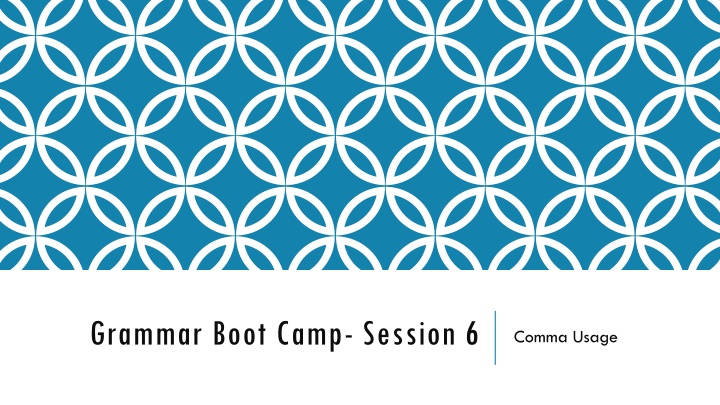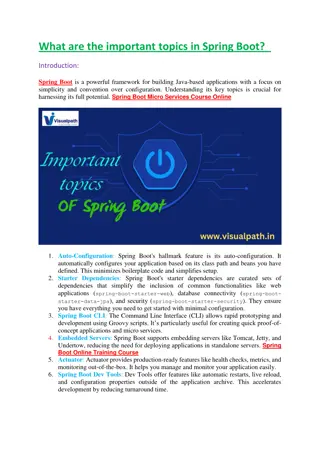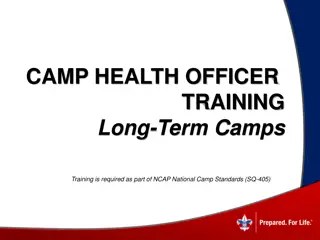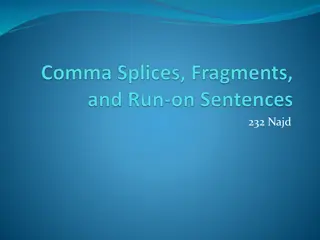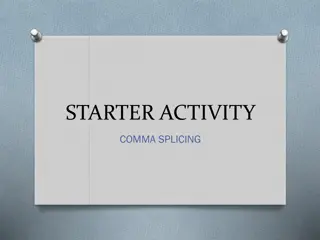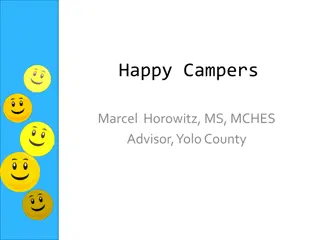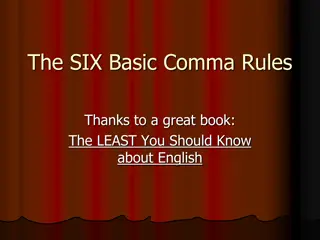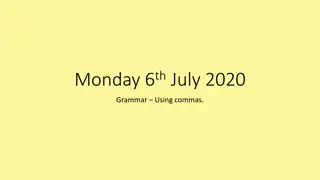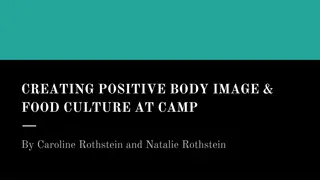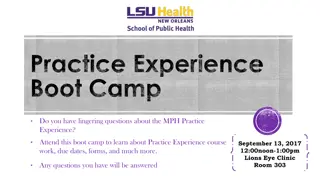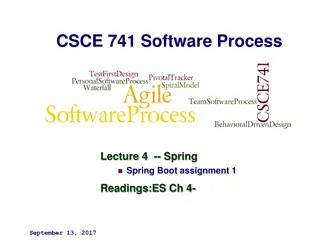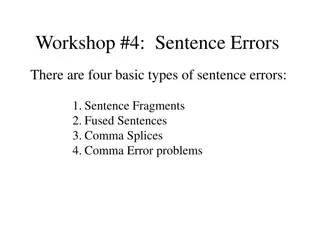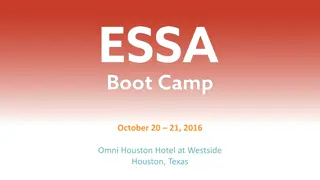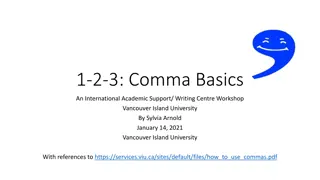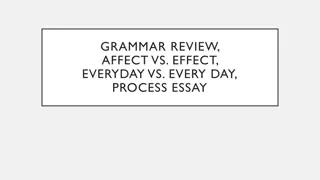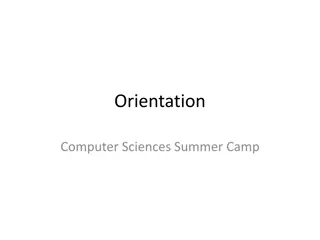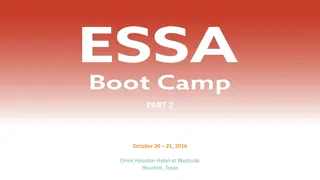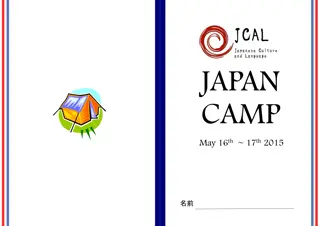Mastering Comma Usage in Grammar: Session 6 Boot Camp
Learn how to effectively use commas in your writing for introducing, connecting, and separating elements. Discover the nuances of adding commas after introductory elements like words of address, verbal phrases, and prepositional phrases. Avoid common mistakes such as placing commas incorrectly before dependent clauses and phrases that may appear as introductory but are actually subjects.
Download Presentation

Please find below an Image/Link to download the presentation.
The content on the website is provided AS IS for your information and personal use only. It may not be sold, licensed, or shared on other websites without obtaining consent from the author.If you encounter any issues during the download, it is possible that the publisher has removed the file from their server.
You are allowed to download the files provided on this website for personal or commercial use, subject to the condition that they are used lawfully. All files are the property of their respective owners.
The content on the website is provided AS IS for your information and personal use only. It may not be sold, licensed, or shared on other websites without obtaining consent from the author.
E N D
Presentation Transcript
Grammar Boot Camp- Session 6 Comma Usage
A Commas Purpose Generally, commas are used for 3 reasons: 1. to introduce 2. to connect 3. to separate
Commas to Introduce We often start sentences with something besides an independent clause. Quick Review: What s an independent clause? A clause (including a subject and verb) that can stand on its own and take a period When a sentence starts with something other than an independent clause, a comma may be required. In a sense, whether it s a clause or phrase, we say it is introducing the independent clause
Commas to Introduce Here are some common introductory elements: We use commas after: words used to address an individual or group Tim, please do your homework. My friends, why are you all so tired? transitional words and phrases (adverbial conjunctions) Consequently, I will buy a Honda instead of a Toyota. As a result, most people choose to study tourism. (You can find a list of common transitional words/phrases on the back of your handout.)
Commas to Introduce We use commas after: verbal phrases that introduce an independent clause Escalating the violence, the crowd started throwing rocks. To win her back, he climbed Mt. Everest. Beaten by her nemesis, Shelly cried. prepositional phrases of 5 or more words At the end of the concert, the band signed photos. In the middle of the mall, Tom located a great ice cream shop.
Commas to Introduce We use commas after: shorter prepositional phrases to prevent confusion With her cat, Sarah slept better. (Sarah s not the cat s name) dependent clauses before independent clauses If I had known that, I wouldn t have bought the coffee. When the game started, the ref tripped and fell. While James doesn t usually go to parties, he made an exception for Josie. See the back of your handout for common words that start dependent clauses.
Commas to Introduce Don t use commas after an independent clause that comes before a dependent clause or prepositional phrase. Tara found an apple, in the middle of the road. Henry went to the police station, when he got off work. Don t use commas after phrases that may look like introductory phrases but are actually subjects Eating apples, is a great way to lose weight. To start a new business in this economy, would be crazy.
Commas to Introduce Quiz In the following sentences, decide 1) if you need a comma, and 2) where to put the ones you need 1. To be an accountant you must study very hard. 2. Nobody likes it when you are late for work. 3. Students I want you to try your best on the test. 4. While camping in the woods they got a rash. 5. At the end of the spelling bee the winner was awarded a scholarship.
Commas to Connect When we join 2 independent clauses, there are certain cases where we will need to use a comma. Quick Review: Can I put just a comma between 2 independent clauses? No, that s a comma splice. (John isn t here, he is at work. )
Commas to Connect When joining 2 independent clauses, we use a comma with: coordinating conjunctions (fanboys) Stephanie walked to the store, and she bought some cereal. Everyone wanted some birthday cake, for it came from Whole Foods. Keep in mind, if it s not 2 independent clauses, we don t use a comma. Louise wanted to go to the park, and the pool. Jessica likes Pepsi, but can t drink too much.
Commas to Connect When joining 2 independent clauses, we use a comma with: a semicolon and a transitional word/phrase I drove my car to the mall; however, it was closed. The school decided to enforce the dress code; therefore, the students were unhappy. While at work, Sam met the CEO; in addition, the CEO promptly fired him.
Commas to Connect Quiz In the following sentences, decide 1) if you need a comma, and 2) where to put the ones you need 1. Joel plans to study architecture and he hopes to make a good salary. 2. To be honest I really don t like him; furthermore we ll break up soon. 3. Even if I can t walk I know I will do great things and make a difference. 4. Alas people really shouldn t throw gum on the ground; certainly this is a bad habit. 5. By the side of the pool Paul found Roger but he didn t find Mary.
Commas to Separate Use commas to separate: items in a series (list) I like salsa, chips, and pizza. Walking, running, and swimming are all great forms of exercise. I walked to the store, ran to the bank, and skipped to the park. adjectives that are describing the same noun or pronoun The sad, lonely man walked to the store. The ragged, old jacket was too ugly to wear.
Commas to Separate Use commas to separate: interrupters (words/phrases that interrupt the sentence) John, however, could not stand the thought of standing anymore. Sarah, on the other hand, was glad to see the ocean. Toby, not Timmy, wanted to see the movie. restrictive/non-essential elements My mom, who is a business owner, knows all about the economy. Her teacher, Mrs. Smith, played a movie during class. The Pattersons, preparing for the move, purchased a ton of boxes. He fell, taking his friends with him.
Commas to Separate What s the difference? 1. My brother, who is an artist, likes to listen to music. 2. My brother who is an artist likes to listen to music. #1 suggests that you only have 1 brother, and the artist part is just extra information. #2 says that you probably have more than 1 brother, and you are talking about the one who is an artist.
Commas to Separate Quiz In the following sentences, decide 1) if you need a comma, and 2) where to put the ones you need 1. John played basketball baseball soccer and football. 2. Valencia College located in Orlando has many international students. 3. The president of the company Mr. Kerry likes his coffee black. 4. The door blew open hitting the wall. 5. Inside the dark smelly cave I lost my keys.
